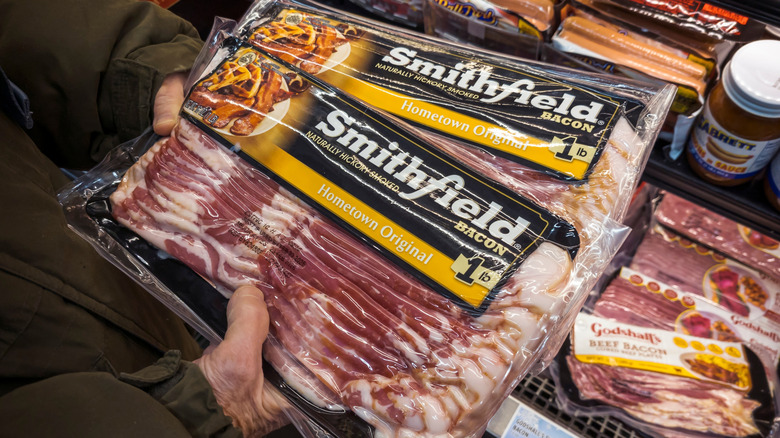America's Biggest Pork Producer Is Actually Owned By A Company In China
For decades pork was marketed as "the other white meat," but nowadays, it could be called the meat that helps keep Smithfield Foods in the black. The company owned an estimated 600,000 hogs in the United States as of 2024, according to Successful Farming. During that fiscal year, it also made roughly $1 billion in profits. The pork giant is behind a wide array of deli meats, franks, bacon, and canned pork products consumed throughout the country. However, you may not know that Smithfield Foods was purchased for $7.1 billion in 2013 by a Chinese company that now goes by the name WH Group.
This might seem like an unexpected turn of events, given Smithfield Foods' history. From its inception, the brand was defined by its location. A company with origins in rural Virginia, it is named after the town where it was founded in 1936. State law would shape the brand's trajectory, as Virginia decreed that authentic Smithfield Hams had to be sourced from peanut-fed hogs raised in Isle of Wight County before they were processed and cured in the town of Smithfield. Over the years, the brand became popular because of its cured hams, and it achieved Fortune 500 status in 1974. Its dominance grew as it acquired other companies, and the purchase of Murray Farms in 2000 made Smithfield the largest hog producer on the planet.
At present, the company's portfolio includes major names like Ekrich, Armour, and Farmland. It even inked a deal with Nathan's Famous, meaning the China-based WH Group owns the hot dog brand behind one of Independence Day's biggest eating contests.
The takeover was not without controversy
At the time of the Smithfield acquisition, WH Group went by a different name: Shuanghui. The purchase broke the record for the largest takeover of an American company by a Chinese corporation. However, the ramifications weren't certain. It appeared that little would change involving day-to-day operations at Smithfield. The Virginia headquarters and management team would stay the same. Due to Smithfield's prominence as a pork supplier, American regulators had to sign off on the deal. However, not everybody was thrilled about the idea.
U.S. officials expressed concerns about Shuanghui due to a 2011 incident involving tainted pork. Shuanghui was allegedly connected to a health scare that involved use of the drug clembuterol, a poisonous fat burner used to create leaner meat. Hundreds of people who ate products sourced from the supplier became sick. The incident triggered meat recalls throughout the country. Yet the perks of the deal would be a boon to the financial relationship between Virginia and China, which had already been progressing at the time. Ultimately, the perceived benefits outweighed the worries.

